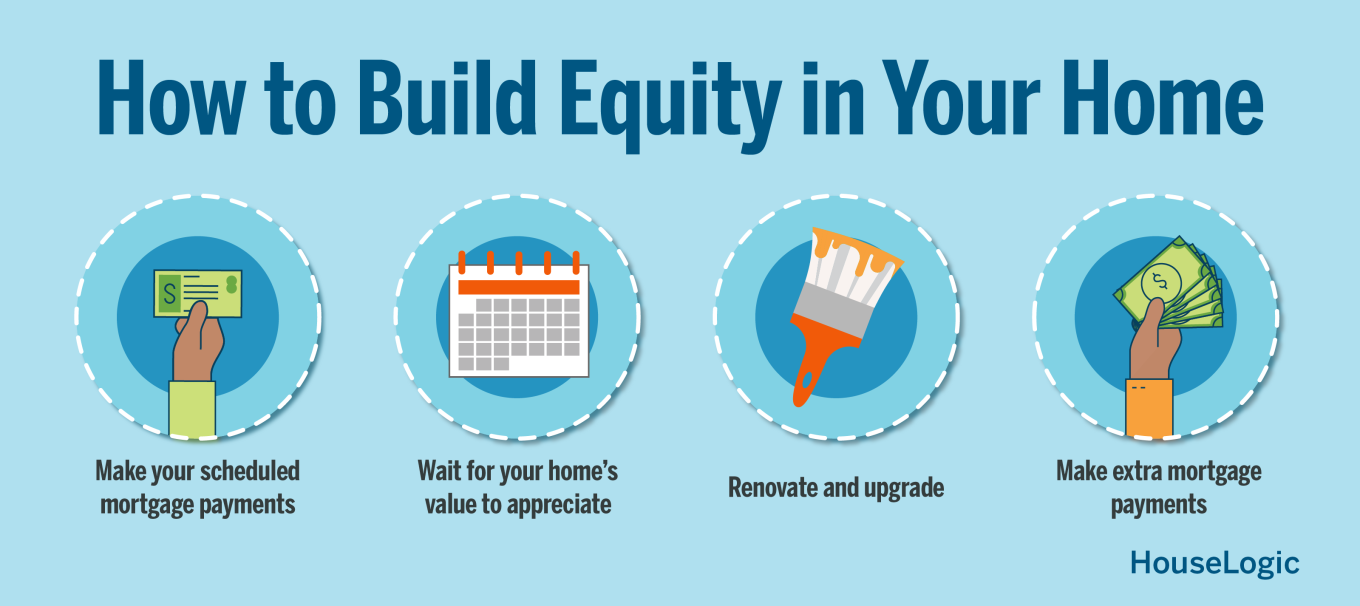As home prices have surged in recent years, homeowners have emerged as the real winners in real estate. You may be shocked at just how much wealth you and other homeowners have built.
“The market’s health is supported by a cumulative 49% home price appreciation for a typical American homeowner from pre-COVID July 2019 to July this year,” says Lawrence Yun, chief economist at the National Association of REALTORS®. Over the last five years, the average homeowner’s wealth has increased by $140,900, NAR research shows.
Potential home buyers and current homeowners need to understand that home equity isn’t just about numbers. It’s a way to manage wealth, leverage assets, and plan for financial goals.
What Affects Home Equity?
Home equity is the difference between how much your home is worth and what you owe on your mortgage. When property values rise or your mortgage debt decreases, equity grows, says Erik Schmitt, digital channel executive at Chase Home Lending.
Local market trends, supply and demand, and broader economic conditions also play a role. “Equity isn’t static. It shifts with deliberate choices, like renovations, and external forces, such as neighborhood demand and economic trends,” says Cliff Auerswald, president of All Reverse Mortgage.
How to Build Equity in Your Home
The length of time it takes to build equity in a home depends on factors including:
- Paying down your mortgage and making extra payments: Even one additional principal payment a year can build equity faster. “As you make mortgage payments and your home appreciates in value, your equity grows, providing a financial resource that can be tapped for various needs,” says Austin Coleman, senior vice president of mortgage lending at America First Credit Union. You can use your home equity to borrow money with competitive rates and flexible repayment terms to avoid higher-interest debt like credit cards, says “Forbes.”
- Home appreciation: Values typically rise about 3% annually, according to Freddie Mac. But regional variation can be significant: Austin, Texas, saw average gains of $154,760 over five years compared to $67,170 in Cleveland, Ohio, according to NAR data.
- Home improvements: Renovations can increase a home’s value. “Thoughtful improvements, such as a carefully executed kitchen upgrade or a bathroom remodel, can reduce the time it takes to build equity,” Auerswald says.

How Do You Calculate the Equity in Your Home?
Financial experts often use this formula:
Current Home Value–Mortgage Balances = Home Equity
Example: John owes $150,000 on a $400,000 home. His equity is $250,000.
Online tools, like Freddie Mac’s Home Equity Calculator, provide estimates, while real estate professionals can offer comps and market analysis tailored specifically to your home.
Common Misconceptions About Home Equity
Here are five frequent misconceptions about home equity:
Home Equity Is the Same as Home Value
Equity is the value you’ve built up in your home, after subtracting debt. It isn't your home’s full market value.
Home Equity Always Increases
Markets fluctuate, though long-term trends favor growth.
Building Equity Can Take Decades
Home improvements and local appreciation can speed it up.
Home Equity Is ‘Free’ Money
Borrowing against equity means taking on debt. “You must repay these loans, and your home now is collateral if you can’t,” Schmitt says.
Borrowing Against Home Equity Depletes All Value in a Home
“Most loans let you borrow up to 80% of value, ensuring you still retain a stake in your property,” Coleman says.
Tapping Into Home Equity
When used responsibly, home equity can fund renovations, education, or debt repayment. Schmitt outlines common financing options:
- Home equity loan: A fixed-rate “second mortgage” with lump-sum funds and set payback installments.
- HELOC: A revolving line of credit, often used for home projects or staggered expenses.
- Cash-out refinance: Replaces your mortgage with a larger loan, giving you the difference in cash.
“It is important to recognize the risks involved,” Schmitt cautions. “If you fail to keep up with payments, you could risk foreclosure.”
Auerswald advises running the numbers. “Compare what you’ll spend in interest to what the investment is likely to earn, and make sure repayments fit your budget. Equity is a tool, not windfall cash, and the best results come from treating it as one component of a larger, well-thought-out financial plan.”
How to Use Home Equity to Build Wealth
Financial experts have long considered home ownership a strong path to building wealth because of equity, Coleman says. “Unlike renting, where payments contribute to a landlord’s wealth, home ownership allows individuals to accumulate equity that can be leveraged for goals such as retirement, education, or investments. Home values tend to appreciate over time, meaning a home purchased today can become a more valuable asset in the future.”
The wealth gap between homeowners and renters is stark: The median net worth for homeowners is projected to reach $430,000 in 2025, versus $10,000 for renters, according to the Federal Reserve Survey of Consumer Finance.
A clear grasp of equity can help homeowners turn appreciation into opportunity, including when selling or purchasing their next home. “By understanding how to build and use home equity strategically, homeowners can make informed decisions that lead to greater financial stability,” Coleman says.
